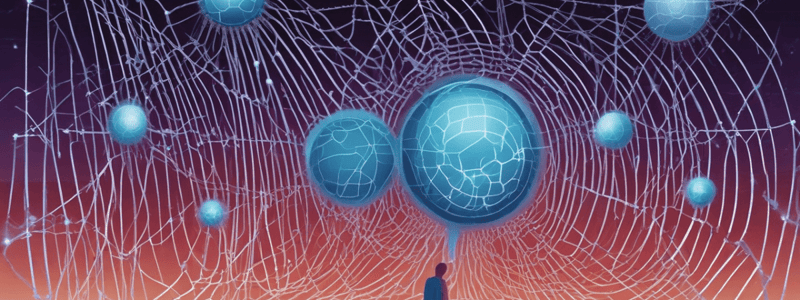Podcast
Questions and Answers
What determines the number of bits that make up the network portion in an IPv4 or IPv6 address?
What determines the number of bits that make up the network portion in an IPv4 or IPv6 address?
- The number of hosts on the network
- The type of connectivity device used
- The version of the IP protocol used
- The prefix length (correct)
What is a characteristic of routable protocols such as IPv4 and IPv6?
What is a characteristic of routable protocols such as IPv4 and IPv6?
- They are not designed to control traffic flow
- They are only used for Ethernet connections
- They allow network designers to segment networks and manage traffic (correct)
- They are not designed to provide redundancy
What is the purpose of the netmask in IPv4 and IPv6 addressing?
What is the purpose of the netmask in IPv4 and IPv6 addressing?
- To determine the type of connectivity device used
- To determine the network portion of an IP address (correct)
- To determine the version of the IP protocol used
- To determine the number of hosts on a network
What is a difference between IPv4/IPv6 and Ethernet?
What is a difference between IPv4/IPv6 and Ethernet?
What are the two sections of an IPv4 or IPv6 address?
What are the two sections of an IPv4 or IPv6 address?
Flashcards are hidden until you start studying
Study Notes
IPv6 Address Types
- Three types of IPv6 addresses: Unicast, Multicast, and Anycast
- Unicast: identifies a single network interface, divided into 64 bits for network and 64 bits for interface
- Multicast: identifies a set of network interfaces, similar to broadcast but doesn't exist in IPv6
- Anycast: identifies a set of interfaces, but packet is delivered to only one address in that set
IPv6 vs IPv4
- Same service ports and protocols (TCP, UDP), but different IP and port representation
- IPv6: [IP address]:port, e.g., [2001:0db8:85a3:08d3:1319:8a2e:0370:7344]:443
- IPv4: IP address:port, e.g., 200.216.10.15:443
- No broadcast feature in IPv6, but similar result can be achieved with ff02::1
- SLAAC (Stateless Address Autoconfiguration) allows IPv6 hosts to self-configure
- TTL (Time to Live) field replaced with "Hop Limit" in IPv6 header
- All IPv6 interfaces have a local link-local address, fe80::/10
Internet Control Message Protocol (ICMP)
- Network layer protocol in TCP/IP stack
- Analyzes and controls network elements
- Functions: traffic volume control, unreachable destination detection, route redirection, remote host status checking
- Used by ping command
IPv6 Characteristics
- 128-bit address, divided into 8 groups of 16 bits, represented by hexadecimal values
- Address representation: 2001:0db8:85a3:08d3:1319:8a2e:0370:7344
- Address abbreviation rules:
- Reducing strings from 0000 to 0
- Omitting group strings with value 0, but only once in the address
Routed Protocols
- IPv4 and IPv6 are routed or routable protocols
- Allow network designers to control traffic flow
- Ethernet is not a routed protocol
- Routable protocols enable network segmentation, redundancy, and traffic management
Studying That Suits You
Use AI to generate personalized quizzes and flashcards to suit your learning preferences.




